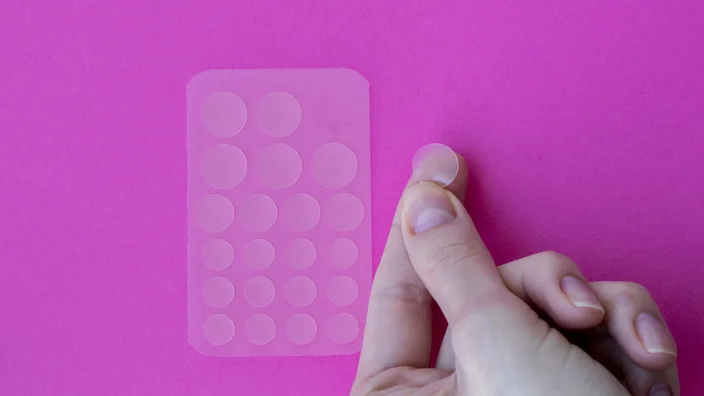
Three students from Universitas Airlangga (UNAIR) have successfully secured funding from PKM-RE. Their innovative project is titled “Development of a Transdermal Patch Based on Epigallocatechin Gallate from Green Tea Leaf Extract (Camellia sinensis) in Nanoliposomes as Breast Cancer Therapy.”
This research team consists of Erika Rahmaningtyas, Faculty of Pharmacy (FF); Nur Majid Putri, Faculty of Pharmacy (FF); Devina Niswah Aulia, Faculty of Advanced Multidisciplinary Technology (FTMM); and An Nadhofah Adlin, Faculty of Nursing (FKP). The PKM-RE team, led by Erika, is supervised by Prof. apt. Rr Retno Widyowati, S Si, M Pharm, Ph D.
The Nanoliposome Patch innovation addresses the high incidence of breast cancer in Indonesia, where treatment options remain limited and costly.
“This research was initiated because a family member of one of our researchers was diagnosed with breast cancer and passed away. Moreover, all members of our research team are women, so we are particularly aware of breast cancer. We observed that breast cancer rates in Indonesia are still very high, while treatment options are very limited and expensive,” said Erika.
Based on this background, the PKM team aims to develop an innovative treatment that can serve as an alternative for cancer patients. Additionally, they hope to reduce costs because, as we know, cancer medications are usually expensive. This way, all cancer patients can benefit from it.
Research Process
The research process undertaken by Erika and her colleagues involved discussions and literature reviews with their supervising lecturer, sourcing raw materials, and preparing mice as test subjects for their innovation.
“We sourced our raw materials directly from Malang to ensure high quality, as we are using green tea leaves. The next steps involved extraction, soaking, and preparation of the formulation. We also prepared mice for in vivo testing, as this research involves animal testing,” Erika explained.
Erika further elaborated on the formulation preparation and testing methods. The formulation preparation involves two stages: optimization and formulation. This ensures the most suitable formulation for our preparation.
“For the testing methods, we used two approaches: in silico, which includes docking, and in vivo with mice that have breast cancer,” she continued.
Innovation Output
The output of this innovation is a nanoliposome patch that is easy for patients to apply and works effectively at a more affordable price. They innovated to provide a transdermal and topical solution by applying the patch to the breast area.
“The medication is formulated in nanoliposomes to facilitate the active ingredient’s absorption into the body, targeting the cells directly. This way, breast cancer treatment becomes an easy-to-apply, more affordable, and quicker alternative for reaching the target receptors,” concluded Erika.
Translation into English
Three students from Universitas Airlangga (UNAIR) have successfully secured funding from PKM-RE. Their innovative project is titled “Development of a Transdermal Patch Based on Epigallocatechin Gallate from Green Tea Leaf Extract (Camellia sinensis) in Nanoliposomes as Breast Cancer Therapy.”
The research team includes Erika Rahmaningtyas, Faculty of Pharmacy (FF); Nur Majid Putri, Faculty of Pharmacy (FF); Devina Niswah Aulia, Faculty of Advanced Multidisciplinary Technology (FTMM); and An Nadhofah Adlin, Faculty of Nursing (FKP). The PKM-RE team, led by Erika, is supervised by Prof. apt. Rr Retno Widyowati, S Si, M Pharm, Ph D.
The Nanoliposome Patch innovation addresses the high incidence of breast cancer in Indonesia, where treatment options remain limited and costly.
“This research was initiated because a family member of one of our researchers was diagnosed with breast cancer and passed away. Moreover, all members of our research team are women, so we are particularly aware of breast cancer. We observed that breast cancer rates in Indonesia are still very high, while treatment options are very limited and expensive,” said Erika.
Based on this background, the PKM team aims to develop an innovative treatment that can serve as an alternative for cancer patients. Additionally, they hope to reduce costs because, as we know, cancer medications are usually expensive. This way, all cancer patients can benefit from it.
Research Process
The research process undertaken by Erika and her colleagues involved discussions and literature reviews with their supervising lecturer, sourcing raw materials, and preparing mice as test subjects for their innovation.
“We sourced our raw materials directly from Malang to ensure high quality, as we are using green tea leaves. The next steps involved extraction, soaking, and preparation of the formulation. We also prepared mice for in vivo testing, as this research involves animal testing,” Erika explained.
Erika further elaborated on the formulation preparation and testing methods. The formulation preparation involves two stages: optimization and formulation. This ensures the most suitable formulation for our preparation.
“For the testing methods, we used two approaches: in silico, which includes docking, and in vivo with mice that have breast cancer,” she continued.
Innovation Output
The output of this innovation is a nanoliposome patch that is easy for patients to apply and works effectively at a more affordable price. They innovated to provide a transdermal and topical solution by applying the patch to the breast area.
“The medication is formulated in nanoliposomes to facilitate the active ingredient’s absorption into the body, targeting the cells directly. This way, breast cancer treatment becomes an easy-to-apply, more affordable, and quicker alternative for reaching the target receptors,” concluded Erika.